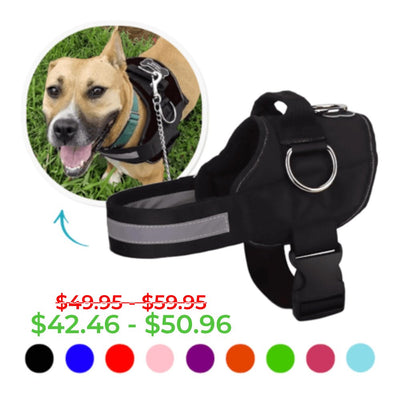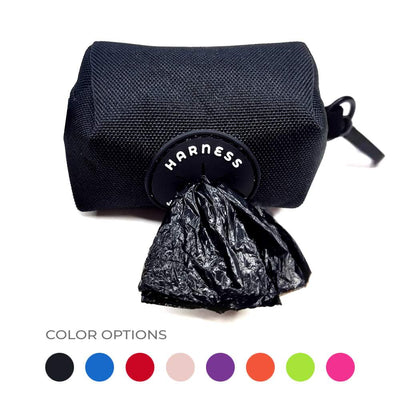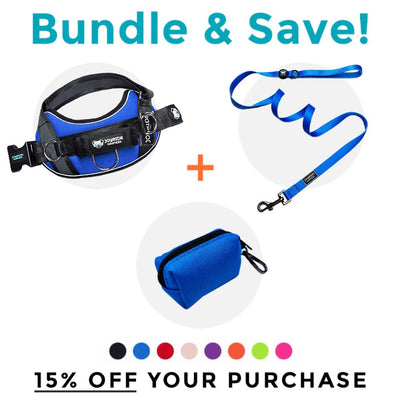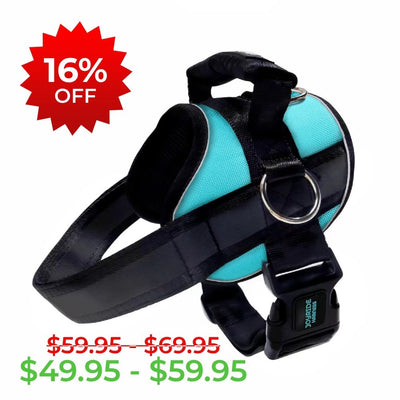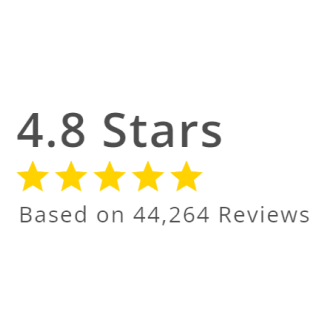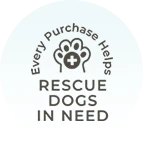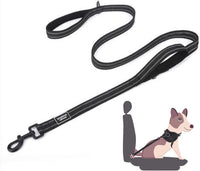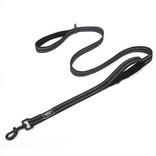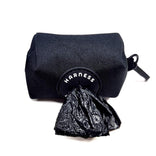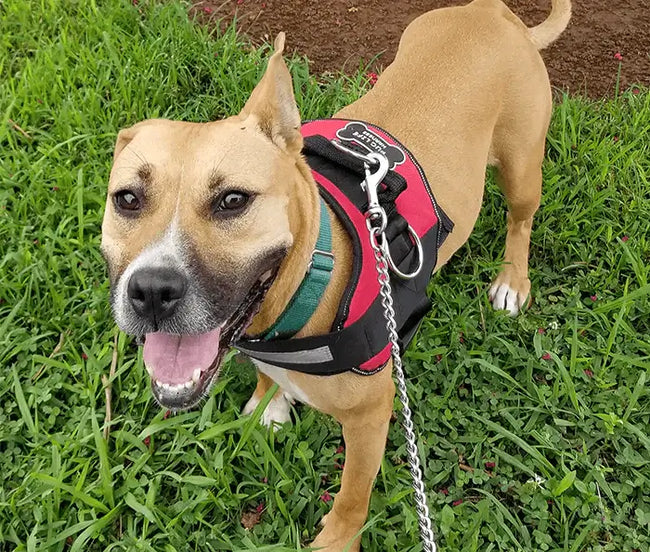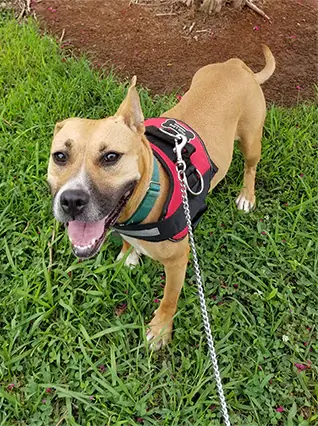Where to Buy a Dog in 2023: How to Find Your Next Best Friend
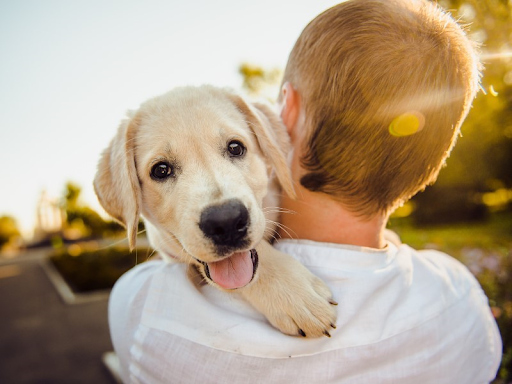
Where to Buy a Dog in 2023: How to Find Your Next Best Friend
Bringing home a new dog is always an exciting time, whether you’re a first-time dog owner or you’ve been a lifeline dog owner. However, one of the first and most crucial questions prospective pet owners grapple with is where to buy a dog. In a world with numerous options, making an informed decision can sometimes feel overwhelming.
At Joyride Harness, we understand that buying a dog is a significant step, laden with the responsibility of choosing an ethical and compassionate source. Whether you are considering adopting from a shelter or purchasing from a responsible breeder, navigating this path with knowledge and awareness is essential.
In this guide on where to buy a dog in 2023, we’ll discuss both responsible breeders and shelters/rescue organizations so you can ensure you are doing your due diligence. Ready to bring home your next companion? We’ll help you get started!
Finding a Responsible Breeder
Before you buy a dog from a breeder, it's essential to understand the significance of responsible breeding. Responsible breeders prioritize the health, well-being, and genetic diversity of the dogs they breed. They are committed to enhancing specific breed characteristics while minimizing potential health issues through careful and ethical breeding practices. By choosing a responsible breeder, you ensure your future dog starts life with a solid foundation of good health and proper socialization.
Identifying a Responsible Breeder
Finding a responsible breeder might require some research, but it's worth your time. Here are some signs of an ethical breeder:
- Transparency and Willingness to Answer Questions: A responsible breeder will be open and transparent about their breeding practices. They should be willing to answer all your questions and provide detailed information about the puppy's lineage and health.
- Clean and Humane Living Conditions: When you visit the breeder's facility, it should be clean and provide a safe, loving environment for the dogs. The dogs should have enough space to move around, and their living areas should be well-maintained.
- Proper Health Screenings and Vaccinations: Responsible breeders ensure that all puppies undergo necessary health screenings and vaccinations. They should provide documentation of the puppy's veterinary visits and health records.
- Positive References and Reviews: Before deciding on a breeder, look for positive references and reviews. You can ask the breeder for contacts of previous clients to get first hand feedback.
- Puppies Are Old Enough to Go Home: Puppies should be at least eight weeks old before they can go home with you, although some breeders will keep them longer. Even though puppies wean around seven weeks old, they learn a lot from staying with their mom and siblings. In fact, it’s illegal in some states to sell a puppy younger than eight weeks old.
- Breeder Support: Good breeders want their puppies to thrive long after they’ve gone to their forever homes. A promising sign of an ethical breeder is lifetime support. If you have any questions about puppy rearing, training, grooming, or even need to rehome due to unforeseen circumstances, your breeder should be willing to help you and your dog, even if it’s years down the road.
Questions to Ask a Breeder
Once you have identified a potential breeder, prepare a list of questions to ask them during your visit or interview. Here are some questions that can help you gauge the breeder's responsibility and ethics:
Breeder Red Flags
The truth is, you’ll likely encounter some not-so-great breeders when looking for a responsible breeder. Here are some red flags that potential dog owners should be wary of when considering a breeder:
- Lack of Transparency: Breeders are unwilling to share detailed information about the puppy's lineage, health records, or breeding practices.
- Unsanitary Living Conditions: Facilities that are dirty, overcrowded, or in poor condition, indicating potential neglect or mistreatment of the animals.
- Multiple Litters Available at Once: Breeders who have many litters available simultaneously or are always advertising puppies for sale. This could be a sign of a puppy mill, where the primary focus is profit, not the well-being of the animals.
- No Health Screenings or Vaccinations: Breeders who do not provide proof of health screenings, vaccinations, or other necessary veterinary care for the puppies.
- Unwillingness to Provide References: If a breeder hesitates or refuses to provide references from previous clients or show testimonials, it might be a sign of previous unsatisfactory experiences.
- High-Pressure Sales Tactics: Breeders who pressure you to make a quick decision or try to rush the sale, without giving you the time to consider your choice carefully or ask necessary questions.
- No Return or Support Policy: A responsible breeder should have a clear policy in place for the return of a puppy in case of unforeseen circumstances and offer support to new owners post-adoption.
- No Opportunity to Meet the Puppy's Parents: A responsible breeder will allow you to meet at least the puppy's mother, giving you an insight into the puppy's potential temperament and the conditions in which they were raised.
-
Lack of Knowledge About the Breed: Breeders who cannot provide detailed information about the breed's characteristics, potential health issues, and care requirements might not be well-versed with the breed they are selling.
Looking for these red flags increases the likelihood of supporting an ethical breeder rather than a puppy mill.

Adopting a Dog from a Shelter or Rescue
Adopting a dog can be a fulfilling experience, offering a second chance to a deserving animal. When considering adoption, it's essential to understand the different types of shelters and rescues available:
- Foster-Based Rescues: These organizations keep dogs in temporary homes until they find a permanent family. It often allows for more personalized care and a better understanding of the dog's personality and needs.
- County Shelters: These are government-run facilities that house stray and surrendered animals. They often have a variety of dogs, from mixed breeds to purebreds, looking for new homes.
- Breed-Specific Rescues: These organizations focus on rescuing and rehoming specific breeds. If you have a particular breed in mind, this could be an excellent place to start your search.
- Nonprofit Organizations and Sanctuaries: These are organizations dedicated to the rescue, rehabilitation, and rehoming of abused, neglected, or abandoned animals. They often provide comprehensive care to ensure the dogs are ready for adoption.
What to Expect When Adopting a Dog
Adopting a dog is a rewarding journey, but it comes with challenges and considerations. Here's what you can expect:
Adoption Process and Requirements
The adoption process can be meticulous to ensure the welfare of the animals. You may need to complete a detailed application, provide references, and undergo an interview and home visit. These steps are designed to ensure a harmonious match between the adopter and the dog. It's also a time for you to ask questions and understand the personality and needs of your potential furry companion.
Pre-Adoption Counseling
Many shelters offer pre-adoption counseling sessions. These sessions are aimed at helping potential adopters understand the responsibilities of pet ownership. They might cover topics like basic pet care, training, and how to introduce your new pet to your home.
Post-Adoption Support
Many shelters and rescues offer post-adoption support to help new pet owners transition smoothly. This support might include access to resources, training advice, and sometimes even veterinary services. Utilize these resources to build a happy and healthy relationship with your new pet.
Potential Challenges and How to Overcome Them
Adopting a dog, especially an adult or one with a troubled past, can sometimes bring challenges. These might include behavioral issues or health problems. It's essential to approach these challenges with patience and empathy. Consider enrolling in training classes and consult with veterinarians to address health concerns. Remember, with time and love, most dogs will settle into their new homes beautifully.

How to Avoid Puppy Mills When Buying a Dog
When researching where to buy a dog, avoiding puppy mills is important. Puppy mills are commercial dog breeding facilities that prioritize profit over the well-being of the dogs. Here's how you can avoid supporting such establishments:
Understanding What Puppy Mills Are
Puppy mills are breeding facilities where dogs are often kept in deplorable conditions, with little regard for their health or happiness. These establishments are profit-driven, with the dogs treated as mere commodities.
Recognizing Signs of a Puppy Mill
To avoid inadvertently supporting puppy mills, be vigilant and look out for the following signs:
- Multiple Breeds Available: Puppy mills often have many different breeds available for sale at once, indicating mass production.
- Lack of Veterinary Records: These facilities usually do not provide comprehensive veterinary records, as the dogs do not receive proper medical care.
- Poor Living Conditions: Dogs in puppy mills are often kept in cramped, unsanitary conditions, with little access to clean water, nutritious food, or proper shelter.
- No Screening Process for Buyers: Puppy mills are more interested in making a sale than ensuring the puppies go to good homes, hence they lack a thorough screening process for potential buyers.
The Consequences of Supporting Puppy Mills
Supporting puppy mills perpetuates animal cruelty and increases the likelihood of purchasing a dog with health and behavioral issues due to poor breeding practices and inadequate care.
Tips to Avoid Puppy Mills
Research Breeders Thoroughly: Before purchasing a puppy, conduct thorough research to ensure you are dealing with a reputable breeder.
Adopt from Shelters or Rescues: Consider adopting from a shelter or rescue, where many loving dogs are looking for their forever homes.
Report Suspected Puppy Mills: If you come across a suspected puppy mill, report it to the local authorities to help prevent further cruelty.
Find the Support You Need After Buying a Dog with Joyride Harness
Adding a dog to your family is a joyous occasion, but it comes with the responsibility of ensuring you choose the right source. Whether you decide to adopt from a shelter or purchase from a responsible breeder, doing your due diligence can help you avoid supporting unethical practices and ensure a happy, healthy start for your new best friend. Remember, a well-informed choice impacts the life of your future pet and contributes positively to the broader animal welfare community.
At Joyride Harness, we want to support dogs and their humans from the first moments to the last. We hope this guide assists you in your journey to finding your perfect furry companion. If you found this information helpful, please share it with others who are considering adding a dog to their family. You can also check out our blog for more tips and tricks for raising a happy, healthy dog.
Do you need a new harness for your new pooch? At Joyride harness, our best-selling no-pull harness is the preferred option for dogs and their owners. And with our Paw it Forward initiative, we donate a portion of our monthly sales to rescue dogs in need. Learn more and find your next best harness at Joyrideharness.com!


